By Emily Hall
Graduate students and academic staff members from UW–Madison’s Writing Center, Writing Fellows program, and Writing Across the Curriculum regularly contribute to scholarly research in the fields of writing studies, writing center studies, writing and community literacy, computers and writing, the scholarship of teaching and learning, and more. Over the summer and through the fall, we have had a remarkable number of WC/WF/WAC participants present their work at national conferences (along with many graduates from our programs!). In this post, we share a little bit about this research to give you a chance to see the exciting intellectual work happening in our programs and the ways research from UW–Madison is influencing the teaching and tutoring of writing around the country. Below you will find a list, organized chronologically, of the conferences and participants, along with abstracts of the presentations, a short quotation that was particularly meaningful to each presenter, and an image from the presentation. We hope you enjoy this brief overview of our recent scholarship.
International Writing Across the Curriculum Conference (IWAC)
August 2–6, 2021
The International Writing Across the Curriculum Conference brought together nearly 500 scholars, teachers, and students who use writing and speaking to enhance learning in disciplines across the curriculum in higher education.
Changing of the Guard: Sustaining Success and Revising Elements of a WAC Program
Presenters: Emily Hall, Mike Haen, and Jonathan Isaac
Abstract: After the long-time director’s retirement in summer 2019, the WAC program at our R-1 university committed itself to sustaining the success of the former director’s twenty-nine year tenure. With this new chapter we continued our past work, including workshops for faculty, university-wide training for new instructors teaching writing-intensive courses, and one-to-one consultations with instructors, but we also tried to innovate and revise some elements of our program. In this session, we discuss our processes for revising particular programmatic elements including (1) a cross-campus partnership with a teaching and learning program for early-career faculty, (2) a “teaching with writing” course for STEM and Social Sciences TAs, and (3) our online resources for the campus community. After situating each of these elements in our institutional context and within broader trends in writing studies (e.g., anti-racist pedagogy and universal design), we explain our revisions and new initiatives over the past year. We also share and reflect on key takeaways from these revisions and initiatives that were made possible through intentional collaborations—within our WAC program and between our program and campus programs. By sharing these narratives that followed “a changing of the guard” in our WAC program, we aim to foster extended discussions about program redesign, especially for new WAC leaders and all leaders interested in social and linguistic justice
Mike Haen
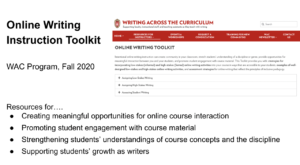 Quotation: “Building on the WAC program’s long-standing commitment to developing high-quality resources for teaching with writing, our WAC and Writing Center staff members have been working on several resources and initiatives that address online teaching. Through soliciting faculty and instructional staff perspectives on our current resources and iteratively evaluating our current resources as a WAC team, we redesigned our campus newsletter, created an online writing instruction toolkit for faculty and instructional staff, and began updating the format of our WAC Sourcebook, which features sample writing assignments and resources for designing writing tasks, evaluating them, and supporting students in the writing process.”
Quotation: “Building on the WAC program’s long-standing commitment to developing high-quality resources for teaching with writing, our WAC and Writing Center staff members have been working on several resources and initiatives that address online teaching. Through soliciting faculty and instructional staff perspectives on our current resources and iteratively evaluating our current resources as a WAC team, we redesigned our campus newsletter, created an online writing instruction toolkit for faculty and instructional staff, and began updating the format of our WAC Sourcebook, which features sample writing assignments and resources for designing writing tasks, evaluating them, and supporting students in the writing process.”
Jonathan Isaac
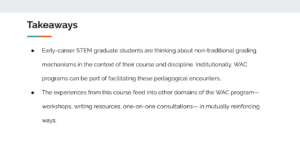 Quotation: “As the WAC program moves forward, we are faced with both the challenges and the opportunities of making antiracist practices and assessment legible in our small corner of the university. WAC work across campus offers real possibility for engaging instructors, building awareness of antiracist assessment practices, and gradually shifting norms in our institution.”
Quotation: “As the WAC program moves forward, we are faced with both the challenges and the opportunities of making antiracist practices and assessment legible in our small corner of the university. WAC work across campus offers real possibility for engaging instructors, building awareness of antiracist assessment practices, and gradually shifting norms in our institution.”
Emily Hall
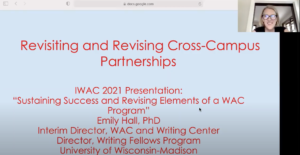 Quotation: “Change is really difficult. As many WAC scholars have pointed out, change is often incremental. WAC leaders must be “in it for the long game” as my colleague Brad says. Often, we must contend with certain expectations from administrators and partners that we continue offering the same programming that we always have–particularly when it has been successful.”
Quotation: “Change is really difficult. As many WAC scholars have pointed out, change is often incremental. WAC leaders must be “in it for the long game” as my colleague Brad says. Often, we must contend with certain expectations from administrators and partners that we continue offering the same programming that we always have–particularly when it has been successful.”
Online Writing Centers Association Conference (OWCA)
October 4–8, 2021
The Online Writing Centers Association Conference took place asynchronously and synchronously around the theme of interdependence in the online writing center and how it can help rethink the meaning of writing center work and the ways in which administrators, tutors, and writers can virtually connect. To learn more about this conference, visit our OWCA post.
Expanding Disability Access: Developing Your Multimodal Toolkit for Writing Center Sessions
Presenters: Ellen Cecil-Lemkin and Lisa Marvel Johnson
 Abstract: What if all writing center tutors had access to a guide that included a range of strategies for working with a variety of students? How would this guide enable access for disabled students? This workshop attempts to answer these questions and develop concrete strategies for working with diverse writers with attendees. This workshop is intended for writing center tutors who have very little experience with accessibility practices, disability theory, and universal design for learning, but who want to learn more about them and apply these ideas to their practices.
Abstract: What if all writing center tutors had access to a guide that included a range of strategies for working with a variety of students? How would this guide enable access for disabled students? This workshop attempts to answer these questions and develop concrete strategies for working with diverse writers with attendees. This workshop is intended for writing center tutors who have very little experience with accessibility practices, disability theory, and universal design for learning, but who want to learn more about them and apply these ideas to their practices.
Quotation: “One of the great things about the writing center is that we have a lot of flexibility in how we go about tutoring our students. We do not have to ask them prying questions about their disability status or try and diagnose them. Instead, we can (1) challenge our own ableism and (2) offer students flexible approaches from the start to tailor the sessions to best suit their needs.”
To learn more about the multimodal toolkit, visit Ellen and Lisa’s post “Developing a Multimodal Toolkit for Greater Writing Center Accessibility.“
International Writing Centers Association Conference (IWCA)
October 20–23, 2021
The International Writing Centers Association Conference is an annual conference for writing center directors, tutors, scholars, and staff. The conference attracts 600–1000+ attendees who participate in hundreds of presentations, workshops, and roundtables over the three-day event. The annual conference is a welcoming event for new and experienced writing center tutors, scholars, and professionals.
Select All That Apply: Embracing our Varied Roles in the Writing Center to Uniquely Impact Linguistic Diversity
Presenters: Emily Bouza, Emily Cheng, and Angela Jentsch
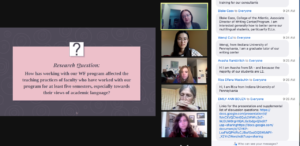 Abstract: In our various roles in Writing Center work, we are constantly balancing between outside language expectations and our own views on linguistic diversity and accessibility. We have conducted a research project exploring the tensions that tutors and faculty both face around language expectations through faculty interviews and reflections from Writing Fellows. In this roundtable, we will share some of our initial findings and invite participants to discuss with us the ways we navigate the tensions we experience in working towards language diversity and accessibility in our Writing Center work.
Abstract: In our various roles in Writing Center work, we are constantly balancing between outside language expectations and our own views on linguistic diversity and accessibility. We have conducted a research project exploring the tensions that tutors and faculty both face around language expectations through faculty interviews and reflections from Writing Fellows. In this roundtable, we will share some of our initial findings and invite participants to discuss with us the ways we navigate the tensions we experience in working towards language diversity and accessibility in our Writing Center work.
Quotation: “‘You’re stuck in between some really idealistic faculty and a world that quite obviously hasn’t caught up’ [quote from an interviewee].”
Accessibility Centered: The Multimodal Toolkit from Theory to Praxis for Writing Center Tutor Training
Presenters: Ellen Cecil-Lemkin and Lisa Marvel Johnson
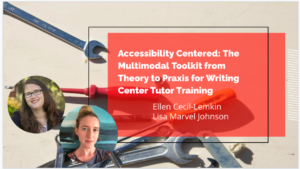 Abstract: This workshop aims to help writing center administrators improve their tutor training to better serve disabled writers. During the workshop, participants will learn relevant skills through discussion, reflection, and critical analysis. It will culminate in participants developing strategies to teach tutors how to implement Universal Design for Learning (UDL) in their tutoring sessions through the creation of a multimodal toolkit. By the end of this workshop, participants will be able to apply the ideas and strategies to design tutor training rooted in UDL.
Abstract: This workshop aims to help writing center administrators improve their tutor training to better serve disabled writers. During the workshop, participants will learn relevant skills through discussion, reflection, and critical analysis. It will culminate in participants developing strategies to teach tutors how to implement Universal Design for Learning (UDL) in their tutoring sessions through the creation of a multimodal toolkit. By the end of this workshop, participants will be able to apply the ideas and strategies to design tutor training rooted in UDL.
Quotation: “Although we work to avoid this, ableism is an entrenched part of the culture of the university, and so rooting it out is a process that we must be actively engaged in. One way of addressing ableism in the context of the classroom or the writing center is through Universal Design for Learning, or UDL.”
A Movement for Radically Accessible Futures: Disability Justice Frameworks for Mental-Health Accessibility in the Writing Center
Presenter: Brenna Swift
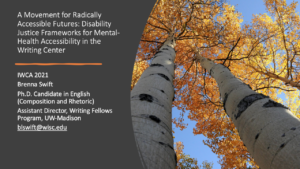 Abstract: In my presentation, I introduced writing center practitioners to the contemporary disability justice movement as a framework for conceptualizing trauma-informed practices and accessibility. Drawing lessons from disability justice activists, I shared ideas for steps that writing centers can take to towards mental-health accessibility (accessibility for people with mental health disabilities). I advocated for an intersectional approach to accessibility and for breaking down barriers that affect multiply marginalized disabled people in our centers. I concluded with recommendations for how writing centers can collaborate with community-based activists to build a future that honors the lives and work of disabled writers.
Abstract: In my presentation, I introduced writing center practitioners to the contemporary disability justice movement as a framework for conceptualizing trauma-informed practices and accessibility. Drawing lessons from disability justice activists, I shared ideas for steps that writing centers can take to towards mental-health accessibility (accessibility for people with mental health disabilities). I advocated for an intersectional approach to accessibility and for breaking down barriers that affect multiply marginalized disabled people in our centers. I concluded with recommendations for how writing centers can collaborate with community-based activists to build a future that honors the lives and work of disabled writers.
Quotation: “What are some concrete first steps your center can take towards mental-health accessibility for both students and tutors? Towards dismantling stigma and ableism from an intersectional approach?”
Conference on Community Writing
October 21–23, 2021
The Conference on Community Writing focuses on writing as a framework to explore how change happens. In the work of social change, writing is necessary, contemplative, therapeutic, coalition-building, and action-based. People coordinate strategies, celebrate successes, design curricula, preserve the past, proclaim manifestos, compose grant proposals, measure outcomes, collaborate across expertise, and much, much more. They create space to pause, reflect, meditate, connect with allies, and then act. In each instance, through their writing processes and products, writers convey the values of who they are, and a shared vision for what will come. By exploring, affirming, and questioning writing processes and artifacts, CCW participants name and examine concrete moments of social change, and by doing so, chart a path toward justice.
Bending Toward Justice: Pursuing Our Ideal Community Writing Center
Presenters: Weishun Lu, Angela Zito, and Michael Haen
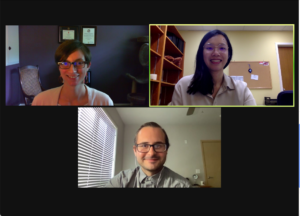 Abstract: This panel will engage attendees in critical reflection on the potential for social justice action in community writing centers by revisiting the central questions and measures of success posited in Tedrowe, Vieira, and Doggart’s 2007 article on the inception of MWA, “Minding the Gap: Realizing Our Ideal Community Writing Center.” Considering the various ways that MWA has expanded its services (e.g., new locations throughout the city, hosting group workshops) and responded to the COVID-19 crisis (e.g., remote tutoring), along with some ways in which MWA has stayed the same, panelists will discuss a few crucial “gaps” through which this program is still realizing what its ideal could look like.
Abstract: This panel will engage attendees in critical reflection on the potential for social justice action in community writing centers by revisiting the central questions and measures of success posited in Tedrowe, Vieira, and Doggart’s 2007 article on the inception of MWA, “Minding the Gap: Realizing Our Ideal Community Writing Center.” Considering the various ways that MWA has expanded its services (e.g., new locations throughout the city, hosting group workshops) and responded to the COVID-19 crisis (e.g., remote tutoring), along with some ways in which MWA has stayed the same, panelists will discuss a few crucial “gaps” through which this program is still realizing what its ideal could look like.
Micheal Haen, “A Reflection on High School Partnerships: Responding to Pandemic Priorities and Needs”
Quotation: “The events of 2020 revealed a gap between (1) our writing center’s initial plans for collaborating with Wisconsin secondary school teachers and (2) teachers’ needs and interests that shifted with the pandemic and the transition to online teaching. We are narrowing this gap by working closely with our colleagues at the Greater Madison Writing Project, who have helped us to both revise our plan so it aligns better secondary educators’ needs and interests and to consider the long-term sustainability of this collaborative work.”
Angela Zito, “Rethinking Access with Community Partners”
Quotation: “While we attempt to (literally) cover as much ground as possible by being present in multiple sites, these physical locations present access barriers that exclude some writers from full participation. For example, some writers may not be able to drive to a library site or may not live near a bus line that would get them there. Likewise, within the physical locations, there may be sensory, affective, or social access barriers that exclude some from full participation. The lighting or white noise of the space might be disruptive, or the demographics of our specific site locations in town might signal whose bodies and languages are more or less ‘welcome’ in that space. Remote writing assistance also poses significant barriers in that it requires access to technology, access to the internet, as well as information and computer literacies.”
Weishun Lu, “Accented Instructors in Community Writing Programs”
Quotation: “All three instructors who self-identified as ‘accented’ emphasized that they never experienced any overt forms of confrontation or conflict during their shifts. But at least two of them talked about how they questioned their interactions with patrons or felt a lack of confidence at some point in their job. Perhaps this is part of how microaggression operates: it puts the emotional labor on the aggressed. As another instructor Clio (pseudonym) puts it: ‘Questioning in the back of my head whether something is microaggression but I’m not sure — it happens all the time.’ Given that all the instructors I are non-Black women of color, it is important to note that our ethno-racio stigma often does not lead to open hostility, but rather sneakier modes of Othering.”
Writing for Social Change Across Communities: Four Sites of Justice, Peace, and Healing
Presenters: Rebecca Lorimer Leonard, Sara P. Alvarez, Juana María Echeverri, Rodrigo Rojas Ospina, Kate Vieira, Marisol Gonzalez-Robriguez, and Gabrielle Kelenyi
Gabrielle Kelenyi and Marisol Gonzalez-Rodriguez, “Participatory Pedagogies: How Adult Undergraduate Students Come to Feel Like Writers in a Community Writing Group”
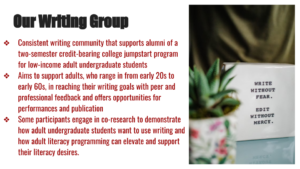 Quotation: “In our writing group, we get together to write as a community and help each other to feel that we are writers even if some of us haven’t been published yet or we just like to write. OWG gives me the confidence of ‘I am a writer.’”
Quotation: “In our writing group, we get together to write as a community and help each other to feel that we are writers even if some of us haven’t been published yet or we just like to write. OWG gives me the confidence of ‘I am a writer.’”
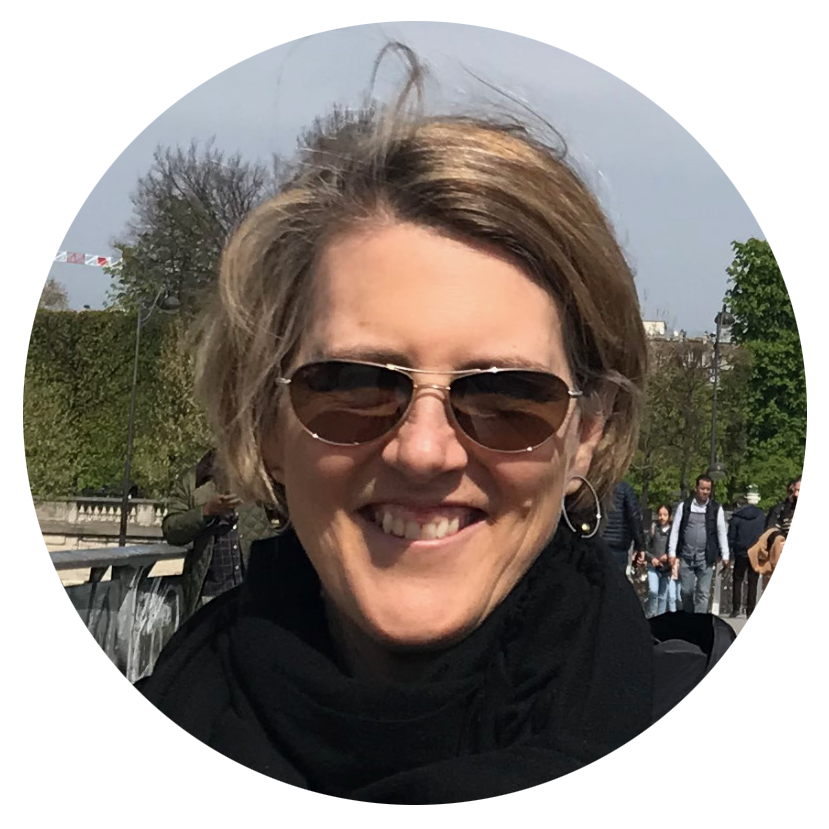
Emily Hall is co-director of Writing Across the Curriculum (WAC) and the Writing Center and the director of the Writing Fellows Program.

